 When we say that Jesus died for our sins, what is it that we mean? As that is recited throughout the world, something like a mantra, people hear it and just commit to rote memory. It has no meaning. Jesus died… for our sins? Even among professing Christians, many are just unable to articulate what it means that Jesus died for their sins. So what does ‘Jesus died for our sins’ mean? The writers of the Bible explained the death of Jesus in substitutionary and penal parlance. When Jesus died, he died in our place. He died in this place of his people. Since God is holy and righteous, he must punish guilty sinners. But since he is also loving and merciful, he wants to allow us to walk free. So while we deserve punishment for our sins, when Jesus died on the cross, he absorbed the punishment that we deserve.
When we say that Jesus died for our sins, what is it that we mean? As that is recited throughout the world, something like a mantra, people hear it and just commit to rote memory. It has no meaning. Jesus died… for our sins? Even among professing Christians, many are just unable to articulate what it means that Jesus died for their sins. So what does ‘Jesus died for our sins’ mean? The writers of the Bible explained the death of Jesus in substitutionary and penal parlance. When Jesus died, he died in our place. He died in this place of his people. Since God is holy and righteous, he must punish guilty sinners. But since he is also loving and merciful, he wants to allow us to walk free. So while we deserve punishment for our sins, when Jesus died on the cross, he absorbed the punishment that we deserve.
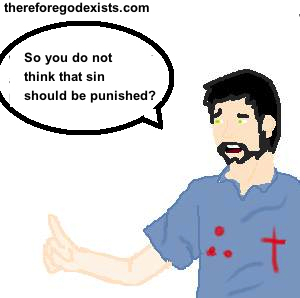 Of course there many who reject the doctrine of substitutionary atonement in favor of some other doctrine of atonement. Some have a predilection toward the Christus Victor model, others toward the Moral Government theory. This post should not be taken as a critique of these models, for I do not necessarily deny them. There are certainly several facets to the atonement. But the most precious one and the most significant and central element of the atonement is in the penal substitution of the Son of God. What does ‘Jesus died for our sins’ mean? Chiefly, it means that he died in our place, absorbing the wrath that is rightly due to us. That is what the writers of the Bible labored and that is what I hope to illuminate for you.
Of course there many who reject the doctrine of substitutionary atonement in favor of some other doctrine of atonement. Some have a predilection toward the Christus Victor model, others toward the Moral Government theory. This post should not be taken as a critique of these models, for I do not necessarily deny them. There are certainly several facets to the atonement. But the most precious one and the most significant and central element of the atonement is in the penal substitution of the Son of God. What does ‘Jesus died for our sins’ mean? Chiefly, it means that he died in our place, absorbing the wrath that is rightly due to us. That is what the writers of the Bible labored and that is what I hope to illuminate for you.
 I will strike the Shepherd, and the sheep will scatter. Some preachers and hymn writers have depicted the atonement in a way that mitigates the wrath of God. It will be said that when Jesus was crucified, the Father had to turn his face away because he cannot bear to see his Son dying. We will portray the crucifixion as horrifying not because of God’s wrath but because of nails, the whips, the beatings, the spears and the blood. While these are certainly horrifying, there have been Christian martyrs throughout the centuries that went to their death singing praises to God. Yet Jesus is found in the Garden of Gethsemane begging the Father to let this cup pass from him (Matthew 26:39). I am not inclined to say that Jesus was in terror about the whips, the swords, the spears, the beatings, the nails or the cross. He was terrified because he was tasked with bearing the sins of the world and bearing the wrath of the Father. It was the Father’s anger, not the nails, that was going to pierce him.
I will strike the Shepherd, and the sheep will scatter. Some preachers and hymn writers have depicted the atonement in a way that mitigates the wrath of God. It will be said that when Jesus was crucified, the Father had to turn his face away because he cannot bear to see his Son dying. We will portray the crucifixion as horrifying not because of God’s wrath but because of nails, the whips, the beatings, the spears and the blood. While these are certainly horrifying, there have been Christian martyrs throughout the centuries that went to their death singing praises to God. Yet Jesus is found in the Garden of Gethsemane begging the Father to let this cup pass from him (Matthew 26:39). I am not inclined to say that Jesus was in terror about the whips, the swords, the spears, the beatings, the nails or the cross. He was terrified because he was tasked with bearing the sins of the world and bearing the wrath of the Father. It was the Father’s anger, not the nails, that was going to pierce him.
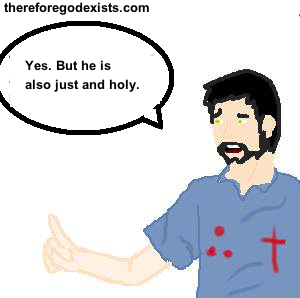 So during the Last Supper, just before he was in the Garden of Gethsemane, Jesus said to his disciples in Matthew 26:31, “You will all fall away because of me this night. For it is written, ‘I will strike the shepherd, and the sheep of the flock will be scattered.'” Jesus was referencing Zechariah 13:7 and applying it to himself. For in that verse, God almighty said, “Awake, sword, against my shepherd, against the man who is close to me!” declares the LORD Almighty. “Strike the shepherd, and the sheep will be scattered…” Jesus is the Shepherd and his disciples are the sheep. When Jesus was stricken, his disciples would fall away. Yet it was God the Father who would strike the Shepherd. What does ‘Jesus died for our sins’ mean? It means that God himself poured his wrath upon the Shepherd.
So during the Last Supper, just before he was in the Garden of Gethsemane, Jesus said to his disciples in Matthew 26:31, “You will all fall away because of me this night. For it is written, ‘I will strike the shepherd, and the sheep of the flock will be scattered.'” Jesus was referencing Zechariah 13:7 and applying it to himself. For in that verse, God almighty said, “Awake, sword, against my shepherd, against the man who is close to me!” declares the LORD Almighty. “Strike the shepherd, and the sheep will be scattered…” Jesus is the Shepherd and his disciples are the sheep. When Jesus was stricken, his disciples would fall away. Yet it was God the Father who would strike the Shepherd. What does ‘Jesus died for our sins’ mean? It means that God himself poured his wrath upon the Shepherd.
 Jesus is our Passover Lamb. When God gave the Law to Moses, there was more than just the 10 commandments. There was a system of animal sacrifices. Westerners may find this difficult to grasp and perhaps even appalling because of our culture, but God commanded his people to kill animals for the atonement of sin (Leviticus 1:4). They would put their hand on the animal’s head, indicating that there was a substitution. The animal died in their place. Since they are not moral agents, sinlessness is symbolized in the animal and they are symbolically thought to bear the sins of the man. God commanded his people to do this because [1] he wanted them to remember the severity of sin by bringing these animals to the altar and [2] it was a foreshadowing of the ultimate sacrifice that would happen in Christ.
Jesus is our Passover Lamb. When God gave the Law to Moses, there was more than just the 10 commandments. There was a system of animal sacrifices. Westerners may find this difficult to grasp and perhaps even appalling because of our culture, but God commanded his people to kill animals for the atonement of sin (Leviticus 1:4). They would put their hand on the animal’s head, indicating that there was a substitution. The animal died in their place. Since they are not moral agents, sinlessness is symbolized in the animal and they are symbolically thought to bear the sins of the man. God commanded his people to do this because [1] he wanted them to remember the severity of sin by bringing these animals to the altar and [2] it was a foreshadowing of the ultimate sacrifice that would happen in Christ.
 Just as animals were sacrificed to take away sin, so also Jesus “has been manifested to put away sin by the sacrifice of Himself.” (Hebrews 9:26). That is why Jesus is called our Passover Lamb (1 Corinthians 5:7), the lamb who was slain (Revelation 5:12), the lamb who takes away the sins of the world (John 1:29) slain before the foundations of the world (1 Peter 1:20). The animals that were slain were a foreshadowing of the Lamb who was slain. Just as the animals were making atonement, pleasing God by their death and bringing about the forgiveness of sin (Leviticus 16:7-10), so also Jesus Christ was the Lamb who was slain, pleasing the Father, dying in our place. What does ‘Jesus died for our sins’ mean? It means that Jesus is our Passover Lamb, that his death is the ultimate culmination of the generations of animal sacrifices.
Just as animals were sacrificed to take away sin, so also Jesus “has been manifested to put away sin by the sacrifice of Himself.” (Hebrews 9:26). That is why Jesus is called our Passover Lamb (1 Corinthians 5:7), the lamb who was slain (Revelation 5:12), the lamb who takes away the sins of the world (John 1:29) slain before the foundations of the world (1 Peter 1:20). The animals that were slain were a foreshadowing of the Lamb who was slain. Just as the animals were making atonement, pleasing God by their death and bringing about the forgiveness of sin (Leviticus 16:7-10), so also Jesus Christ was the Lamb who was slain, pleasing the Father, dying in our place. What does ‘Jesus died for our sins’ mean? It means that Jesus is our Passover Lamb, that his death is the ultimate culmination of the generations of animal sacrifices.
 How could God ignore sin? This is not a question that only theologians and academics ponder. It strikes to the core of our daily lives, every time we turn on the news and hear some terrible story. We have instant access to everything that is going on in the world and it may raise a few questions in us. How could God allow such things to occur? If he really is a good God, how could he allow so much evil? Why does he not bring his wrath upon sinful people? (If somebody is thinking like that, they are just a few steps away from becoming a Christian. Why would God not bring his wrath upon you?) This is a question that people have wrestled with throughout the generations. People sin and there are just no consequences. What about when God’s people sin? How could God allow his people to have eternal life? This is perhaps one of the greatest philosophical questions in human history. How could God forgive anybody? He is supposed to be a God of perfect justice.
How could God ignore sin? This is not a question that only theologians and academics ponder. It strikes to the core of our daily lives, every time we turn on the news and hear some terrible story. We have instant access to everything that is going on in the world and it may raise a few questions in us. How could God allow such things to occur? If he really is a good God, how could he allow so much evil? Why does he not bring his wrath upon sinful people? (If somebody is thinking like that, they are just a few steps away from becoming a Christian. Why would God not bring his wrath upon you?) This is a question that people have wrestled with throughout the generations. People sin and there are just no consequences. What about when God’s people sin? How could God allow his people to have eternal life? This is perhaps one of the greatest philosophical questions in human history. How could God forgive anybody? He is supposed to be a God of perfect justice.
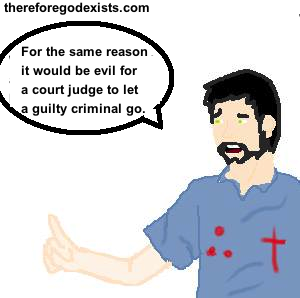 As a proleptic exercise, I would like to point out that this is not merely philosophical reasoning that assumes categories and parlance that the biblical writers may not have used. Paul the apostle wrote in Romans 3:24-25, “Christ Jesus, whom God displayed publicly as a propitiation in His blood through faith. This was to demonstrate His righteousness, because in the forbearance of God He passed over the sins previously committed…” Throughout the generations before the time of Christ, it could be asked how God could forgive sins and still be righteous. God passed over sins previously committed and hence had to demonstrate his righteousness. He did that by displaying Jesus publicly as a propitiation. What does ‘Jesus died for our sins’ mean? It means what Romans 3:24-25 says. God passed over sins and proved his righteousness by pouring out his wrath on his Son.
As a proleptic exercise, I would like to point out that this is not merely philosophical reasoning that assumes categories and parlance that the biblical writers may not have used. Paul the apostle wrote in Romans 3:24-25, “Christ Jesus, whom God displayed publicly as a propitiation in His blood through faith. This was to demonstrate His righteousness, because in the forbearance of God He passed over the sins previously committed…” Throughout the generations before the time of Christ, it could be asked how God could forgive sins and still be righteous. God passed over sins previously committed and hence had to demonstrate his righteousness. He did that by displaying Jesus publicly as a propitiation. What does ‘Jesus died for our sins’ mean? It means what Romans 3:24-25 says. God passed over sins and proved his righteousness by pouring out his wrath on his Son.
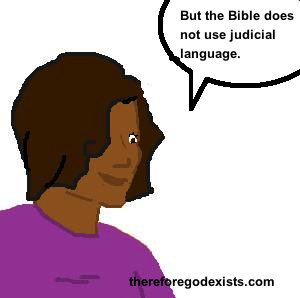 Our sins were nailed to the cross. People often think of their forgiveness from God as emanating from something that they did, some task that they performed or some feat that they accomplished or a life that they lived in righteousness. Since they did good things, God will forgive their sins. But Paul tells us that we are forgiven because the death of the Christ on the cross. There is a dependence of our forgiveness upon his death. He writes in Colossians 2:13-14, “…having forgiven us all our transgressions, having canceled out the certificate of debt consisting of decrees against us, which was hostile to us; and He has taken it out of the way, having nailed it to the cross.”
Our sins were nailed to the cross. People often think of their forgiveness from God as emanating from something that they did, some task that they performed or some feat that they accomplished or a life that they lived in righteousness. Since they did good things, God will forgive their sins. But Paul tells us that we are forgiven because the death of the Christ on the cross. There is a dependence of our forgiveness upon his death. He writes in Colossians 2:13-14, “…having forgiven us all our transgressions, having canceled out the certificate of debt consisting of decrees against us, which was hostile to us; and He has taken it out of the way, having nailed it to the cross.”
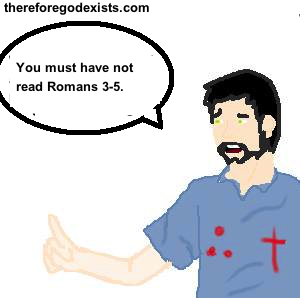 God is able to forgive us because the sins that we committed against him were nailed to the cross. The debt consisting of decrees that were held against us is nailed to the cross and abolished. When Jesus was murdered, he bore our sins. Isaiah 53:11 says that he bore the iniquities of many. He bore the sins of his people and then those sins were nailed to the cross with him. But this implies that he bore the penalty that we deserve. If he bore our sins on the cross, being crushed by the Father (Isaiah 53:10), then this is the doctrine of substitutionary atonement in everything but name. What does ‘Jesus died for my sins’ mean? It means that he bore our sins, that they were nailed to the cross and now there is no debt that we owe to God. It has been satisfied.
God is able to forgive us because the sins that we committed against him were nailed to the cross. The debt consisting of decrees that were held against us is nailed to the cross and abolished. When Jesus was murdered, he bore our sins. Isaiah 53:11 says that he bore the iniquities of many. He bore the sins of his people and then those sins were nailed to the cross with him. But this implies that he bore the penalty that we deserve. If he bore our sins on the cross, being crushed by the Father (Isaiah 53:10), then this is the doctrine of substitutionary atonement in everything but name. What does ‘Jesus died for my sins’ mean? It means that he bore our sins, that they were nailed to the cross and now there is no debt that we owe to God. It has been satisfied.
Does this make God a moral monster? The doctrine of substitutionary atonement sometimes violates the sensitivities of certain individuals. They think that suggests that God is just a maniac who is looking for somebody that he can take out his rage on, and so he chooses Jesus. So they have an emotional predilection against the favor of substitutionary atonement. There are a few things worth nothing in response to this. First, that emotional predilection does not change what the Bible says. God’s word is true even if we do not like it. It is unhelpful to caricature God or to render moral judgments upon God lest we be guilty of the sort of arguments that atheists use. We need to remember that God is more loving and wise than we are, and hence it is unthinkable that we would stand in judgment over him.
Second, this objection seems to assuage the holiness of God. It implies that God just does not care about sin. But think of a court judge who was like that. If a court judge did not think much of sin and just let guilty criminals go, we would think that he was a corrupt and an immoral judge. Letting sinners go is a nefarious act. God is not nefarious. He must punish those who are guilty. But his standard is much higher than human judges. His standard is moral perfection in thought, word and deed. Thus Paul tells in Romans 1:18, “For the wrath of God is revealed from heaven against all ungodliness and unrighteousness of men…” All unrighteousness and all ungodliness. No serious reading of Bible can forego God’s holiness. God is perfectly holy and perfectly just. We must not salve our emotional predilection by altering God’s character lest we impugn God’s character.
Church history. There is a concept known as the development of doctrine. That is not to say that we are inventing doctrine as time goes on. We are not finding new sources and assimilating them to develop these doctrines. Rather, the doctrine of substitutionary atonement has always been in the Bible. But Saint Anselm was the first popularize this doctrine (so it is usually attributed to him). Even if we were to grant for charity that the doctrine of substitutionary atonement was nowhere to be found in church history prior to Anselm, it does not follow that it is therefore not a biblical doctrine. Most doctrines that Christians believe in were developed over time. But that is not to say that they are not found in Scripture. Often when the early church was not perspicuous in the outlining of their view of a particular doctrine, it is because nobody was challenging it. The early church spent most of its’ time defending the trinity and left a lot of other important issues aside.
Further, as Doctor Michael Kruger pointed out in his article Did The Early Christians Believe In Substitutionary Atonement? there are writings of the early church that very heavily imply it. Doctor Kruger relies on the second century document known as the Epistle to Diognetus. The author of that letter covers a number of topics and appealing to language very similar to what I used this article. He said that Christ bore our sins, that his righteousness covers us, he emphasized love and grace and the severity of sin. He writes, “For what else could hide our sins but the righteousness of that one? How could we who were lawless and impious be made upright except by the son of God alone? Oh the sweet exchange! . . . That the lawless deeds of many should be hidden by the one who was upright, and the righteousness of one should make upright the many who were lawless! (9.3-5)”
What does ‘Jesus died for our sins’ mean? It means that there was a sweet exchange. Your unrighteousness for the righteousness of Jesus Christ.
There is nothing that you can contribute to your salvation. That sweet exchange is far removed from the minds’ of men. Men would not and cannot conceive of this gospel. It is foolishness to those who are perishing (1 Corinthians 1:18). Men can only conceive of a system of actions and merit. The idea of grace, that penetrating unmerited favor that seeks after unbelievers and ungodly men is obscene. We want to do something. We want to contribute something. That is why many Christians want to add to their salvation. Many Christians want to contribute a lifetime of works by a process of ongoing justification. They want to contribute religious rituals such as water baptism. But that is not the gospel. We are not saved by water baptism and we are not justified by a lifetime of works.
We are saved for one reason and one reason only. On the cross, Jesus Christ absorbed the wrath of God that we deserve. He died in our place and then he rose from the dead. Since he died in our place, there is nothing more that we can contribute to our salvation. It is solely his work. What does ‘Jesus died for our sins’ mean? It means that his righteousness is imputed to us because our unrighteousness was imputed to him. Our unrighteousness was nailed to the cross so that his righteousness could be given to us. Hence we are justified because of the death and resurrection of the Messiah, and for no other reason. Any addition to this sweet exchange is a departure from the biblical gospel.
If you would like to get in on the discussion about this, join my Theology Discussion Group!